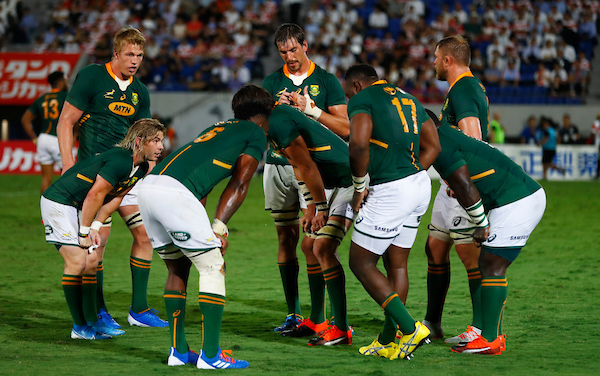The World Cup warm-up between Japan and South Africa highlighted the importance of fitness and smart bench management at a tournament staged in punishing heat, writes JON CARDINELLI.
Consider where the Boks were four years ago.
The Vodacom Super Rugby franchises were in a sorry state. When Heyneke Meyer got the Boks together for a conditioning camp before the World Cup, he was alarmed to note that only three players were up to the required standard of fitness.
Rassie Erasmus has transformed South African rugby in more ways than one. There’s been a move to improve the fitness levels of the players at franchise level. The recruitment of athletic performance coach Aled Walters has paid significant dividends when one reflects on some of the Boks’ recent performances – particularly against New Zealand.
Japan was always going to present a new challenge as far as fitness was concerned. Erasmus made this point shortly after the announcement of the World Cup squad on 26 August. The Bok coach highlighted the importance of adapting to local conditions. He confirmed that this was the reason the group would arrive in Japan before any other foreign side.
PLAYER RATINGS: Mapimpi, Kolbe impress
It’s fair to say that the decision to do so will give them an edge ahead of the opening game of the tournament. Their performance against Japan was by no means perfect, but they would have got more out of the exercise in Saitama than the All Blacks did in their recent 92-7 win against Tonga in Hamilton.
The day before the game against Japan, a photo was posted on social media showing the Bok players without their shirts. It was plain to see that the bulk of the squad was in peak physical condition.
And yet, 60 minutes into the game in Saitama, there was a notable drop in intensity. A few players were red in the face, and every player that started was drenched in sweat. The unforgiving heat took its toll and the Boks battled to get over the gainline as regularly as they did in the first half.
The Boks will adjust in the next two weeks. Walters recently stated that it will take 10 days or so to fully adjust to the local conditions. By the time the Boks face the All Blacks in Yokohama, they will have been in Japan for more than three weeks.
ALSO READ: Game management Boks’ new challenge
There will be a lot of talk about which players should start against the All Blacks. Given what we witnessed in Saitama, it may be time to start talking about the makeup of the bench with the same respect.
The All Blacks will only arrive in Japan next week. They’re one of the fittest teams on the planet and tend to shift through the gears in the latter stage of a contest. They will take time, however, to get used to the heat in Japan and may not be at their breathtaking best until later in the tournament.
How the Boks finish will be all-important in Yokohama. And with the heat in mind, perhaps Erasmus needs to consider alternatives in specific positions and possibly even a different dynamic on the bench.
Who is the better finisher between Beast Mtawarira and Steven Kitshoff? I spoke to Kitshoff a couple of years ago when he was a regular on the bench. He revealed that the role of a substitute can be more physically demanding than that of a starter.
Kitshoff’s move to the bench should not be viewed in a negative light. On the contrary, it should be seen as a ploy aimed at boosting the Bok effort and ensuring that the side gets over the line against New Zealand.
The issue of Frans Malherbe’s fitness has been debated at length. While he boasts a reputation as one of the more mobile and astute props in open play, he hasn’t been at his best this season.
As World Cup-winning captain John Smit stated at a function held in Johannesburg last Thursday, Trevor Nyakane should be favoured to start at tighthead. Nyakane is expected to recover from his current leg injury.
Will Erasmus stick with a 5-3 split, or will he try to squeeze an extra loose forward on to the bench at the expense of a back?
The beauty of having a player like Frans Steyn in the mix is that he can cover flyhalf, both centres, and fullback, while starting backs such as Lukhanyo Am and Willie le Roux can cover wing.
A Bok match-day side that has Kitshoff, Bongi Mbonambi, Vincent Koch, RG Snyman, Francois Louw, Kwagga Smith, Herschel Jantjies and Steyn on the wood isn’t going to run out of gas in the latter stages of a big contest.
The modern game has evolved to the point where all 23 players are needed to secure a result in the big games. The tournament in Japan, however, may see substitutes playing an even greater game-shaping role.
Photo: Steve Haag via HollywoodBets






